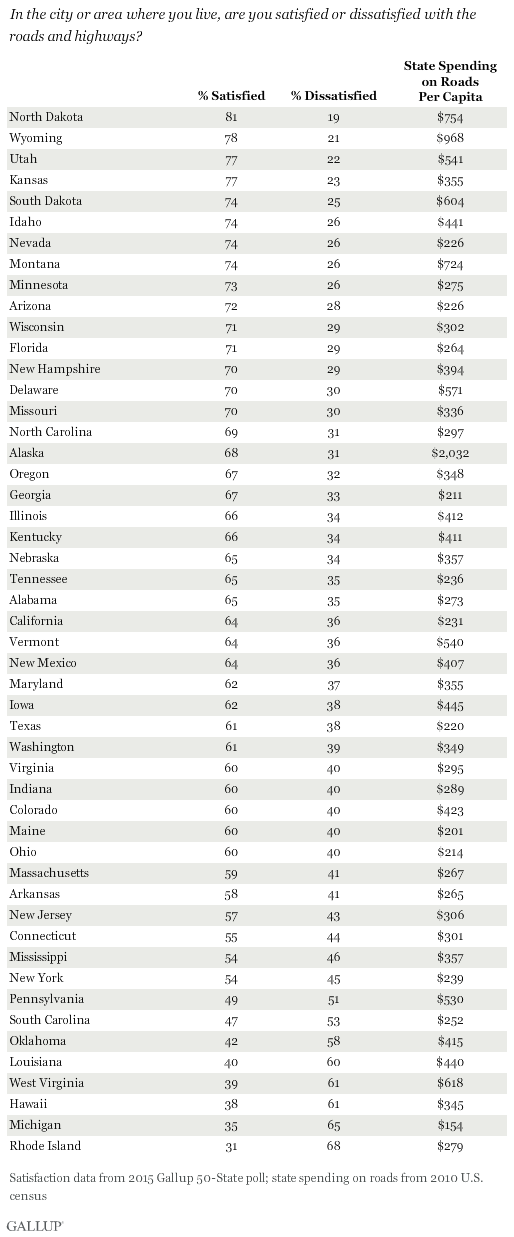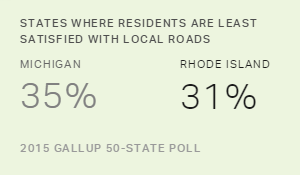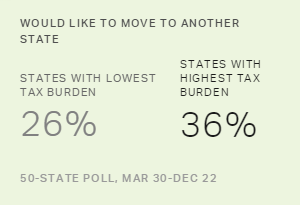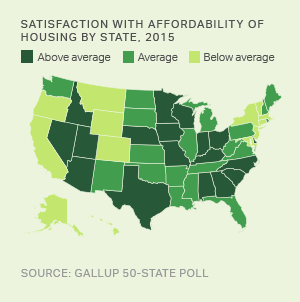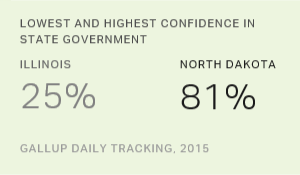Story Highlights
- 31% of Rhode Island and 35% of Michigan residents are satisfied
- Satisfaction with local roads highest in North Dakota, at 81%
- State spending on roads is positively related to satisfaction levels
PRINCETON, N.J. -- Rhode Island (31%) and Michigan (35%) residents are less likely to be satisfied with the roads and highways where they live than are residents in any other state. North Dakota has the highest satisfaction at 81%, followed closely by Wyoming, Utah and Kansas.
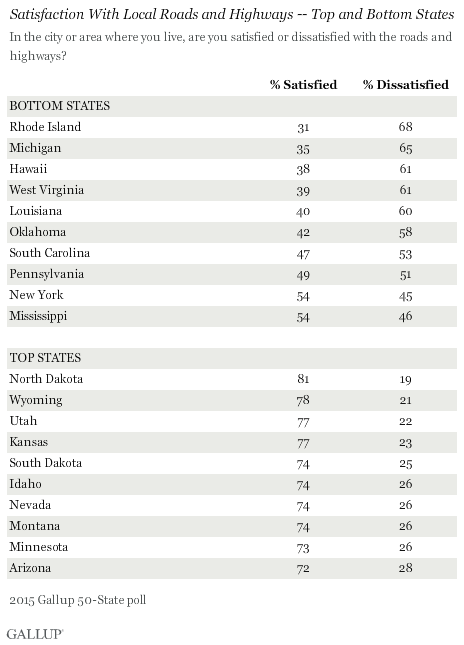
The results are based on Gallup's 2015 50-State poll, which consists of interviews with at least 500 residents in each state. The data for each state appear at the end of the article.
States vary widely in how much they spend on road construction and maintenance, and how they raise that revenue. There is a modest positive correlation between state spending on roads per capita and residents' satisfaction with roads -- states that spend more tend to have higher satisfaction.
The 10 states spending the most per capita on roads average 67% satisfaction, compared with 61% satisfaction among the 10 states spending the least per capita on roads. The middle 30 states average 60% satisfaction.
North Dakota, Wyoming and Utah rank among the top-spending states on roads and, along with Kansas, are the states where residents are most satisfied. Michigan spent the least per capita on roads, according to the most recent data from the U.S. Census Bureau, with Rhode Island ranking in the bottom third of states.
Rhode Island and Michigan have consistently ranked among the states with the worst-quality roads, based on studies of road conditions from government agencies and independent research organizations. Michigan voters named roads as the most important problem facing the state in a 2014 poll. State political leaders there have struggled to find a way to increase spending on roads. The governor and state lawmakers agreed on a deal in late 2014 that asked voters to approve an increase in state sales and gasoline taxes to help pay for road improvements, among other things, but voters overwhelmingly rejected that ballot proposal. Last fall, the governor and legislature finally agreed on legislation to raise the gas tax and increase vehicle registration fees to raise revenues to fix the roads.
In Rhode Island, the governor signed legislation this month to impose driver tolls on trucks as a way to raise money to fix the state's ailing roads and bridges.
Hawaii Only Western State With Below-Average Satisfaction
Many of the states with above-average resident satisfaction with local roads and highways are in the Upper Midwest and Upper West regions of the country. In the West, all the states have above-average or average satisfaction except Hawaii. The remaining states with below-average satisfaction are in the South and East, along with Michigan in the Midwest.
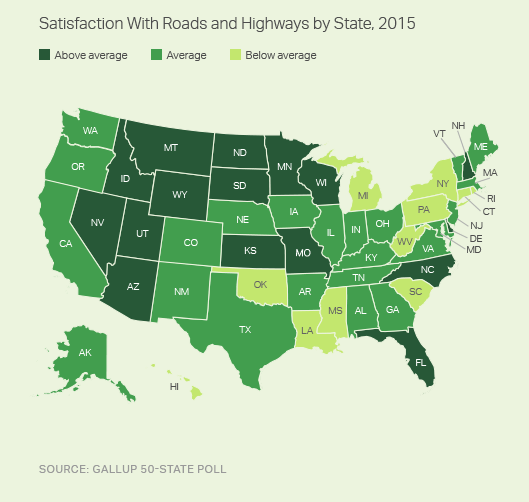
Many of the states whose residents are most likely to be satisfied with local roads and highways are less densely populated. An analysis of the data confirms there is a negative correlation between state population density and satisfaction with roads -- more densely populated states' residents tend to be less satisfied with road and highway conditions.
Implications
Solid infrastructure, including well-designed and well-maintained roads and bridges, are key to the functioning of a local economy. But supporting a state's infrastructure requires a significant investment from the government, and states differ in terms of how much revenue they are willing to raise from citizens and on what projects they are willing to spend it. While there isn't a strong relationship between state spending on roads and state residents' satisfaction with local roads and highways, states that spend more tend to have modestly higher satisfaction than states that spend less.
In two states in which residents are least satisfied with the condition of roads and highways -- Rhode Island and Michigan -- state lawmakers have recently agreed on plans to greatly increase the amount of money the state devotes toward upkeep of its roads and bridges. Other states with low satisfaction, including West Virginia and South Carolina, are also considering measures to increase funding for roads, but passage of these measures is far from assured.
These data are available in Gallup Analytics.
Survey Methods
Results for this Gallup poll are based on telephone interviews conducted March 30-Dec. 22, 2015, with random samples of approximately 500 adults, aged 18 and older, living in each of the 50 U.S. states. Data are weighted to account for unequal selection probability, nonresponse and double coverage of landline and cellphone users in the two sampling frames. Data are also weighted to state estimates of gender, age, race, Hispanic ethnicity, education and phone status (cellphone only, landline only, both, and cellphone mostly).
For results based on the total sample of adults in each state, the margin of sampling error is ±6 percentage points at the 95% confidence level. All reported margins of sampling error include computed design effects for weighting.
Each state sample includes roughly 60% cellphone respondents and 40% landline respondents. Landline and cellular telephone numbers are selected using random-digit-dial methods.
